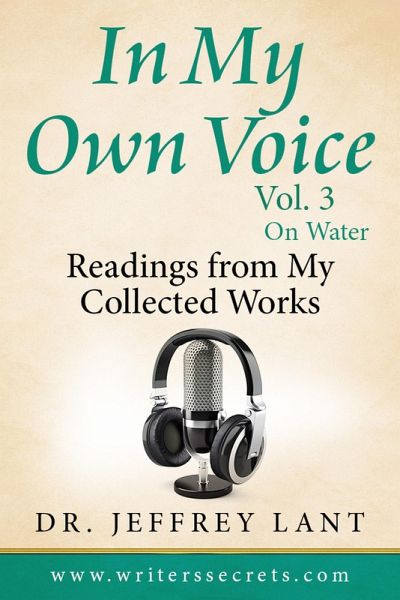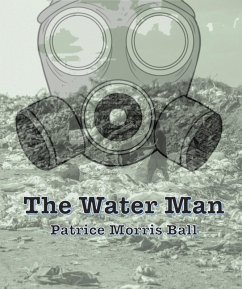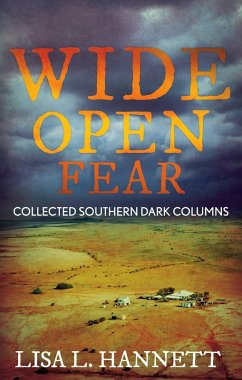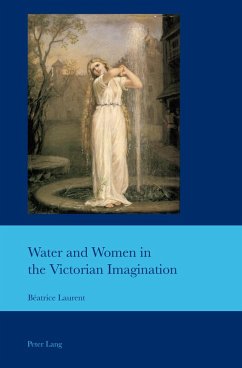
In My Own Voice. Reading from My Collected Works - On Water (eBook, ePUB)
Sofort per Download lieferbar
9,38 €
inkl. MwSt.

PAYBACK Punkte
0 °P sammeln!
I was moved to write this book after I saw a picture of one of the greatest rivers on Earth, the Colorado, It is a picture of water removed, thus life removed. It is the Colorado River, no longer God's splendid creation, but merely a rocky water pipe, nothing but a riverbed. There are a hundred such miles at the end of the Colorado system, a hundred miles of the 1,450 mile waterway now has only the slightest memory of water, much less powerful water on a race to the great Pacific.And you think, "Where did that massive river go?" How could they there be up to a hundred feet deep, whilst here re...
I was moved to write this book after I saw a picture of one of the greatest rivers on Earth, the Colorado, It is a picture of water removed, thus life removed. It is the Colorado River, no longer God's splendid creation, but merely a rocky water pipe, nothing but a riverbed. There are a hundred such miles at the end of the Colorado system, a hundred miles of the 1,450 mile waterway now has only the slightest memory of water, much less powerful water on a race to the great Pacific.
And you think, "Where did that massive river go?" How could they there be up to a hundred feet deep, whilst here retain nothing but the memory of a majestic presence, majestic no longer, just thought-provoking, and even frightening.
For we know if the giant river can lose a hundred miles, it can lose a hundred more. And if the water level has dropped and dropped again, why so it can drop yet again and more.
This book is the story of water. It is the culmination of many streams of thought and information. My mother, for example, contributed the thought that one must write about big issues, issues which cannot be solved in a hour or day, but need a lifetime's commitment. She would have been proud that I tackle, on so many occasions, the issue that is water.
My father contributed a joyous obsession with America's national parks, particularly the Grand Canyon. I was a teenager at the scoffing age when my father insisted we live up to Horace Greeley's famous line "Go West young man, go West." And so we did, to marvel as all marvel who approach this sinuous deity, for we know we could not have created such a spectacle ourselves. We needed massive assistance from a greater being, who gave it freely.
I thank my brother, age 8 or so, for his assistance in gathering Illinois Maple seeds. We threw these tiny helicopters with abandon over the sides of the Canyon, only to discover its many ridges and ledges blocked their descent.
I added my two cents too, by studying the mudflats where once the full panoply of water possibilities fertilized the landscape, now moribund.
It might have been as notable as Egypt's Nile based civilization. Civilization came to Egypt via the Nile. By contrast, civilization failed to reach the mudflats at the end of the Colorado because there was no water running there, and so there was no Valley of the Kings, no water-borne Pharaohs, nothing of greatness, except a clear understanding of the great loss that took place when water departed. Sadly, most people still do not understand the loss or its magnitude, but it affects them every single day.
In this book, I take up five water based stories. What they have in common is that each features a way that water may be presented and used, so that future generations will have less to blame us about.
I give you five views of water, shared with readings made especially to go along with this volume the third in my series "In My Own Voice. Reading from My Collected Works"
And you think, "Where did that massive river go?" How could they there be up to a hundred feet deep, whilst here retain nothing but the memory of a majestic presence, majestic no longer, just thought-provoking, and even frightening.
For we know if the giant river can lose a hundred miles, it can lose a hundred more. And if the water level has dropped and dropped again, why so it can drop yet again and more.
This book is the story of water. It is the culmination of many streams of thought and information. My mother, for example, contributed the thought that one must write about big issues, issues which cannot be solved in a hour or day, but need a lifetime's commitment. She would have been proud that I tackle, on so many occasions, the issue that is water.
My father contributed a joyous obsession with America's national parks, particularly the Grand Canyon. I was a teenager at the scoffing age when my father insisted we live up to Horace Greeley's famous line "Go West young man, go West." And so we did, to marvel as all marvel who approach this sinuous deity, for we know we could not have created such a spectacle ourselves. We needed massive assistance from a greater being, who gave it freely.
I thank my brother, age 8 or so, for his assistance in gathering Illinois Maple seeds. We threw these tiny helicopters with abandon over the sides of the Canyon, only to discover its many ridges and ledges blocked their descent.
I added my two cents too, by studying the mudflats where once the full panoply of water possibilities fertilized the landscape, now moribund.
It might have been as notable as Egypt's Nile based civilization. Civilization came to Egypt via the Nile. By contrast, civilization failed to reach the mudflats at the end of the Colorado because there was no water running there, and so there was no Valley of the Kings, no water-borne Pharaohs, nothing of greatness, except a clear understanding of the great loss that took place when water departed. Sadly, most people still do not understand the loss or its magnitude, but it affects them every single day.
In this book, I take up five water based stories. What they have in common is that each features a way that water may be presented and used, so that future generations will have less to blame us about.
I give you five views of water, shared with readings made especially to go along with this volume the third in my series "In My Own Voice. Reading from My Collected Works"
Dieser Download kann aus rechtlichen Gründen nur mit Rechnungsadresse in A, B, CY, CZ, D, DK, EW, E, FIN, F, GR, H, IRL, I, LT, L, LR, M, NL, PL, P, R, S, SLO, SK ausgeliefert werden.













